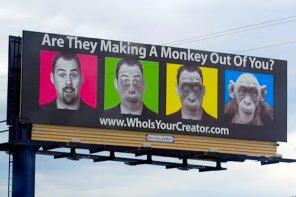With Ben Stein’s new intelligent design documentary now in theaters [RD review here], evolution is again in the news. To many this may seem a bit like gravity getting headlines. (This just in: Objects at rest tend to stay at rest. Objects in motion tend to stay in motion.) But the sheer stubbornness of those who doubt Darwin begs the question of whether disagreements about evolution are truly concerned with the origins of life, or something much more immediate.
Advocates of intelligent design insist that recent developments in cellular biology are to thank for their renewed conviction that the work of a divine hand is detectable in nature. It’s an argument that might be more convincing if the current anti-evolutionary moment did not have so much in common with Darwin’s earlier posthumous appearances on the national stage.
In our periodic national obsession with evolution, we’re living now in a post-Dover era. The 2005 court case between parents and a religiously conservative Pennsylvania school district successful challenged the teaching of intelligent design as an alternative to evolution in high school science classrooms. The parents won the case with the help of the ACLU, which made it clear in the endless press coverage that it believed more than the proper teaching of biology was at stake.
The last time Darwin saw so much ink may have been between 1955 and 1960, when the play and then the film Inherit the Wind told the story of the infamous “Scopes Monkey Trial,“ in which a teacher was charged with giving lessons on human evolution in Tennessee, where it remained illegal to do so until 1967. When the play was written, the nation was in the grip of a recession and a Red Scare; playwrights Jerome Lawrence and Robert Edwin Lee presented Scopes’ call to teach evolution as a sly protest against McCarthyism and the culture of fearful conformity it had wrought. As in Dover, Inherit the Wind put Darwin in the headlines, but the news wasn’t about his theory. It was about something greater.
Three decades earlier, in summer of 1925, Darwin was a focus of the Monkey Trial itself, the context of which is actually more telling than the content. Four years prior to the stock market crash, the United States was already in the midst of what the historian Robert Handy once called the “American Religious Depression,” a period in which the spiritual mood of the nation (and particularly the rural Protestantism of places like Dayton, Tennessee, where the trial was held) was “greatly affected by the general disillusionment of the postwar decade.” In other words, the Scopes Trial, and the media fervor surrounding it, was in some ways a symptom of a religious malaise.
1925, 1955, 2005: What do these dates in American history have in common? Other than, say, the long shadow of war, recession, and deep ambivalence about the role of religious and political identity in the life of the nation, I can’t imagine what.
Arguments about evolution reappear like clockwork at times of national uncertainty, times at which Americans are questioning not just the origins of life, but its direction. As Karl Giberson, longtime advocate of peace between Darwin’s proponents and detractors, suggests in his forthcoming book, ”Saving Darwin” (HarperCollins, 2008), “the debate about evolution is not about evolution at all.”
Could it be that Darwin is so often questioned and so forcefully defended because he provides efficient shorthand for grappling with all the big questions at once? What we talk about when we talk about evolution is not merely biology; it’s about meaning. Which only makes the questions it raises that much harder to answer.



